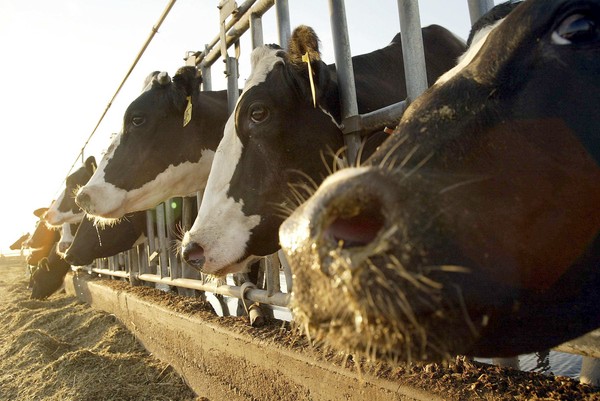FDA Urged to Ban Feeding of Chicken Feces to Cattle

Farmers feed 1 million to 2 million tons of
so-called poultry litter to their cattle annually, according to FDA
estimates. The litter includes feces, spilled chicken feed, feathers and
poultry farm detritus. (David
McNew / Getty Images)
A coalition of food and consumer groups that includes Consumers Union
and the Center for Science in the Public Interest has asked the Food and
Drug Administration to ban the practice of feeding chicken feces and
other poultry farm waste to cattle. McDonald's Corp., the nation's
largest restaurant user of beef, also wants the FDA to prohibit the
feeding of so-called poultry litter to cattle.
Members of the coalition are threatening to file a lawsuit or to push
for federal legislation establishing such a ban if the FDA doesn't act
to do so in the coming months.
Using the litter -- which includes feces, spilled chicken feed,
feathers and poultry farm detritus -- increases the risk of cows
becoming infected with bovine spongiform encephalopathy, or mad cow
disease, said Michael Hansen, a senior scientist at Consumers Union.
That's because the spilled chicken feed and the feces contain tissue
from ruminants, such as cows and sheep, among other mammals. The disease
is transmitted through feeding ruminant remains to cattle.
"It takes a very small quantity of ruminant protein, even just 1
milligram, to cause an infection," said Steve Roach, public health
program director with Food Animal Concerns Trust, a Chicago-based animal
welfare group that is part of the coalition.
Although it is rare, people can contract a fatal form of the disease by
eating meat from cows with BSE.
The National Cattlemen's Beef Assn., the beef industry's main trade
group, said the ban was not needed and that several FDA reviews had
determined that the chance of cattle becoming infected with mad cow
disease from eating poultry litter was remote.
"Science does not justify the ban, and the FDA has looked at this now
many times," said Elizabeth Parker, chief veterinarian for the trade
group.
Parker noted that the FDA this year banned the use of certain types of
tissue from any form of animal feed, even that eaten by chickens. Those
tissues include brain, spinal cord material and other high-risk tissues
where the pathogens believed to cause mad cow disease typically are
found. The tissue ban greatly reduces chances that prions, implicated in
mad cow, can find their way into the food chain, Parker said. She also
said the disease was not a threat to public health.
"We have tested 800,000 cattle in recent years and have not found any
evidence of BSE circulating in the herd," Parker said.
But others remain concerned.
"I still think you need to totally restrict using any ruminant protein
in feed that gets back to ruminants," said Linda Detwiler, a food safety
consultant and former U.S. Department of Agriculture veterinarian.
Prohibiting high-risk tissues as a feed source makes the chances of
transmitting mad cow disease through poultry litter low but does not
remove all risk, Detwiler said.
The practice also makes McDonald's, one of the nation's biggest
beef purchasers, nervous. "We do not condone the feeding of
poultry litter to cattle," it said in a statement.
The issue has kicked around since the first U.S. case of mad cow
disease was discovered almost six years ago in an animal
imported from Canada. There have been two known indigenous cases
of mad cow infections in domestic cattle since then, but both
were in animals born before the enactment of stricter regulation
of feed.
Generally, the FDA has left the decision on whether to feed
cattle poultry litter up to state regulators. California allows
the practice with one exception: Poultry litter is banned in
feed for lactating dairy cows.
In 2004, the FDA announced its intention to prohibit the use of
poultry litter in cattle feed, but after reviewing the proposed
ban decided against it. The agency said its rules prohibiting
the use of high-risk tissues in all animal feed were sufficient
to keep mad cow pathogens from reaching poultry feed. The FDA
also said there was little risk to human or cattle health from
the other components of poultry litter.
"With respect to pathogenic microorganisms, drug residues and
contaminants in poultry litter, FDA is not aware of any data
showing that the use of poultry litter in cattle feed is posing
human or animal health risks that warrant restrictions on its
use," the agency said.
But Hansen, the Consumers Union scientist, said that besides the
mad cow risk, the feed can contain disease-causing bacteria,
antibiotics and even foreign objects such as dead rodents,
rocks, nails and glass.
Such hazards are not eliminated by any processing of the feed
that might occur, he said.
Feeding farm animals feces may sound gross, but it goes back to
the dawn of animal agriculture, said Dean Cliver, professor
emeritus of food safety at UC Davis.
"In the old days when people had mixed farms, what came out the
back end of the cows was eaten by pigs, and what came out the
end of pigs was eaten by chickens. That was the natural way of
farming," he said. "Anything that hit the ground was fair game."
jerry.hirsch@latimes.com
twitter.com/latimesjerry
Copyright © 2009,
The Los Angeles Times |
